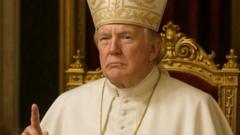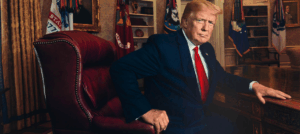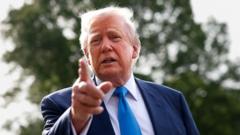This year's VE Day is marked by mixed feelings across Europe, where a legacy of unity against Nazism is overshadowed by concerns over current political climates influenced by figures like Donald Trump. Historical alliances are questioned as Russia's actions and changing defense priorities reshape expectations for European security.
VE Day Reflections: Europe's Memory and Modern Challenges in the Trump Era

VE Day Reflections: Europe's Memory and Modern Challenges in the Trump Era
As Europe commemorates Victory in Europe Day, the shadow of former President Trump introduces complexities to transatlantic relationships and historical perspectives.
In a sobering reflection on Victory in Europe (VE) Day, observers have echoed sentiments of disappointment rather than celebration, particularly in the shadow of Donald Trump's influence on transatlantic relations and security. “Celebration? What celebration? It feels more like a funeral,” lamented a senior figure from NATO, anonymously expressing concerns about the diminished spirit of unity that characterized the post-World War II era. While VE Day traditionally signifies triumph over fascism and a coalition of Allied nations, today’s ceremonies evoke complex emotions, particularly with Russia’s ongoing aggression toward Ukraine.
The historical context is vital: approximately 51 million soldiers and civilians perished in the global conflict, and the sacrifices made by nations, especially the Soviet Union, played a crucial role in defeating Nazi Germany. However, as Michael Zantovsky, former Ambassador from the Czech Republic, points out, the transient nature of alliances during the war did not lay a lasting foundation for enduring friendships. Tenuous relations between the West and Russia began immediately after Germany’s defeat, leading to separate commemorative practices—highlighted by the ongoing significance of May 9 in Russia.
Reactions to VE Day differ significantly across Europe. Western Europe utilizes the day to celebrate democracy and liberation, while in Central and Eastern Europe, the memories of transitioning from Nazi occupation to Soviet rule complicate the narrative. Countries like Czechoslovakia experienced Soviet dominance post-war, which has colored local perspectives on remembrance. Describing VE Day as a dual moral landscape, Zantovsky notes, “Our liberty from the Nazis was framed as a debt to the Soviets.”
Currently, the attitude toward Putin’s regime and its military parades contrasts sharply with the sentiments towards Trump's past rhetoric, which many Europeans interpret as favorable to authoritarian figures. Amidst this backdrop, tension escalates surrounding the Ukraine conflict, prompting fear in Eastern Europe as Trump's perceived indifference towards Russian aggression shapes European security outlooks.
The historical partnership between Europe and the U.S., reinforced through NATO and the Marshall Plan in the post-war era, has been challenged by shifting geopolitical priorities, with the Trump administration's focus imbued with skepticism towards traditional allies. This fracturing is underscored by the alarming views of Europeans who see the U.S. as emerging in opposition to their security, with polls indicating a growing distrust, especially in the context of Trump’s comments concerning NATO allies.
As European nations reconsider their defense strategies, discussions around increased military spending have gained traction, especially following the evident shift in U.S. foreign policy priorities towards Asia. For many, the desire to establish an independent European defense strategy is both an acknowledgment of changing realities and a necessity for security in a post-VE landscape.
Reflecting on these dynamics and the lessons of the past, commentators suggest that Europe must cultivate new leadership steeped in collaborative efforts to address shared threats rather than solely relying on transatlantic ties. Although concerns loom over militarization and resource allocation, the desire for a united, strong European front is evident. The vital question remains: can Europe truly come together again, or are we destined to reflect on these challenges with historical trepidation similar to that of 80 years ago?


















